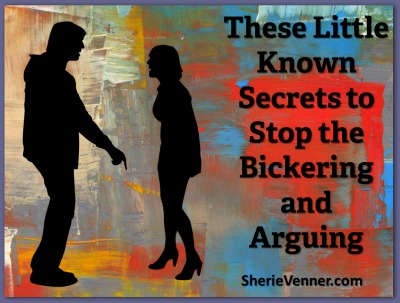Everything is  going along well. Then, out of the blue, you find yourself in an angry argument with your partner/spouse. It’s not a knock down and drag out fight. But it’s a disagreement.
going along well. Then, out of the blue, you find yourself in an angry argument with your partner/spouse. It’s not a knock down and drag out fight. But it’s a disagreement.
You find yourself frustrated, trying to find the right words to explain your point of view. Your partner is doing the same. You both approach the disagreement from a view point of “I’m right. You’re wrong”.
How is that working for you?
It doesn’t work well for most folks.
And you know, it’s very hard to see the other person’s point of view when you’re angry, frustrated or upset. There is an escalation of feelings. Anger raises its ugly head. Words are said that should never have been said. You can’t take them back, can you?
Some people become silent and withdraw. They feel like they are being bludgeoned or “beat over the head” by the emotions of the other person, the one who is expressing their anger and frustration with yelling, angry arm waving and gestures, and frowns and scowls.
What Can You Really Do to Stop the Arguing?
During an argument, there is a dividing. There is a sense of being alone and against the other partner. It is very difficult to have rapport in this situation.
So, there are two ways to approach stopping an argument. One way is a stop dead in the tracks way. The other way is more subtle. Let’s talk about the subtle way first.
There is a saying that the person with the most flexibility in a relationship has more resources and I believe that is true. Imagine this.
Bob and Sue are arguing over who should have taken the garbage out. Sue is yelling that they discussed this the night before and it’s her turn. She starts to raise her voice more when she sees that Bob is becoming more silent, standing there in front of her with his head hanging down, unresponsive.
If Bob had flexibility in how he reacted in a fight like this, he would be able to match the level of her voice. He wouldn’t need to be yelling. He would just raise his voice to be as loud as her voice. He could make similar arm movements. This is called matching and mirroring.
Sue would then begin to see that he was responding. When she felt that they were in more rapport, Bob could begin to lead Sue by example. He could start to lower his voice and make his arm gestures smaller. When he saw that she was beginning to do the same, then he could lead them both to a calmer place.
It sounds simple but sometimes simple works really well, doesn’t it?
My Favorite Way to End the Bickering
It’s called a pattern interrupt and it works brilliantly.
Let’s go back to Sue and Bob, to the beginning of the garbage argument. Let’s say this time that Bob is the one who is angry, speaking loudly and waving his arms around. You get the picture.
Sue knows about pattern interrupts and decides that she is going to try it out. Here, the important factor is the element of surprise.
Although, some couples that I have worked with have a predetermined pattern interrupt, that they choose beforehand. That works, too!
Sue allows herself to not get dragged into the fight. She maintains an emotional distance. When she sees the opportunity, she jumps in with this.
“Look at that!!” Sue says excitedly “The neighbor is in the backyard naked!!” and she turns around and points to the window. Now, do you think that Bob is going to continue yelling or do you think there is a good chance that he will stop and think “What??” Most people do.
It’s like when you have a piece of music playing and you either take the needle off the record (for the vinyl aficionados out there) or you hit the pause button in the middle of a crescendo.
This works best before an argument has escalated to the point of no return. You know what I mean?
So, give this a try when it’s a bone to pick type of disagreement. This is not for an all and out brawl. So, whichever way you choose to stop an argument, remember that it’s important to not get emotionally sucked into it. That is the most important step.
“Drive your own life…you deserve to, don’t you?” Sherie Venner
Sherie
Latest posts by Sherie (see all)
- The Truth About Getting Beyond Survival Mode in a Crisis - April 6, 2014
- Overcoming Emotional Pain: Easy or Not? - March 2, 2014
- If You Can Do This Like A Navy Seal, Then You Can Knock Out Stress - November 3, 2013


Comments on this entry are closed.
I end the arguments and the bickering with my partner by compromising with him. After we cool off our steam of course.